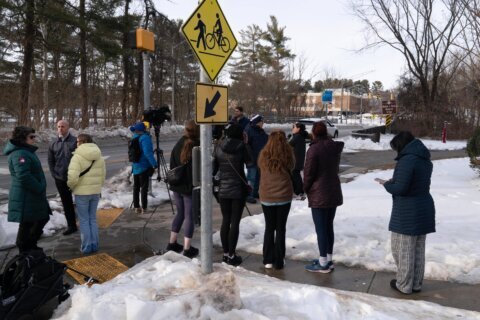Federal grants to enhance security and mental health initiatives will be awarded to historically Black colleges and universities that have received recent bomb threats, Vice President Kamala Harris said Wednesday.
More than one-third of the nation’s HBCUs received bomb threats in the past three months; they’re now eligible to receive awards from the Project School Emergency Response to Violence (Project SERV) program at the Department of Education, which typically range between $50,000 and $150,000.
“As you might imagine, with the threats we’ve received, now two in one semester, it has caused additional anxiety among our students,” said Bowie State University President Aminta H. Breaux. “We have upgraded our mental health counseling to help support students but more is needed.”
Stress being experienced by students, faculty and staff related to the pandemic and social injustice is causing demands for mental health support at Bowie State to begin to exceed capacity. Breaux emphasized that more counselors need to be hired.
Grant money devoted to enhancing safety and security, emergency management planning and response will be used, in part, to enhance physical infrastructure and surveillance cameras on campus.
“We have cameras already, but this is a different time. And these are different circumstances. We have a heightened sense … to protect the campus and in different ways,” she said.
- More Local News
- More Education News
More is needed than one-time grants.
Breaux is asking legislators at all levels to understand what she characterizes as the new landscape for higher education.
“And especially, especially for our historically Black colleges and universities, where we’ve seen the rise of social injustice and concerns and threats,” Breaux said.
Last week, the U.S. Senate passed a bipartisan resolution to reaffirm the duty of the federal government to protect college students, faculty and staff against acts of violence. Co-sponsors of the measure included Maryland Democratic Sens. Chris Van Hollen and Ben Cardin.
“The Department of Education’s Project School Emergency Response to Violence (SERV) program can provide immediate mental health assistance for students and staff as a result of these tragic events. I applaud the Vice President’s announcement that our Maryland HBCUs that have faced these threats will now be eligible for funding under this program,” Cardin told WTOP in a statement.
“In addition to supporting the mental health needs of students, the Consolidated Appropriations Act, 2022 included language I fought to secure that would allow HBCUs to utilize a portion of their COVID-19 recovery Higher Education Emergency Relief Fund (HEERF) allocations on infrastructure needs, including security related infrastructure improvements,” he said.
“I want to thank at this time, our own Congressman Steny Hoyer, who reached out to me immediately following the bomb threats and asked again what can he do? What can our legislators do? And he took to the floor last week to advocate for solidarity, to support our HBCUs,” Breaux said.
Federal resources across multiple agencies and departments are being made available to help HBCUs with long-term improvements.
“As President (Joe) Biden indicated in Executive Order 14041 — which reestablished the White House Initiative on HBCUs — HBCUs have a proud history and legacy of achievement. That legacy continues with more than 100 HBCUs, located in 19 states, the District of Columbia, and the U.S. Virgin Islands that serve nearly 300,000 students annually,” according to a White House statement. “These storied institutions have excelled, in the face of discrimination, and their strength and convictions will not be compromised by these violent bomb threats.”
“HBCUs are part of the fabric of our history in this country,” Breaux said. “We provide a vital economic benefit to our communities through our graduates who return to their communities and give back in so many ways. They’re part of the pipeline into the workforce. We are addressing the diversity, equity and inclusion needs of the workforce. So we need to support the safety, just basic safety of our campuses and our youth.”








